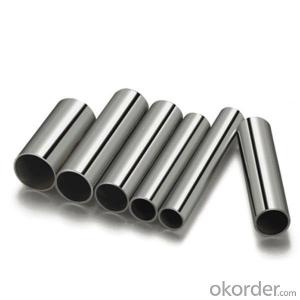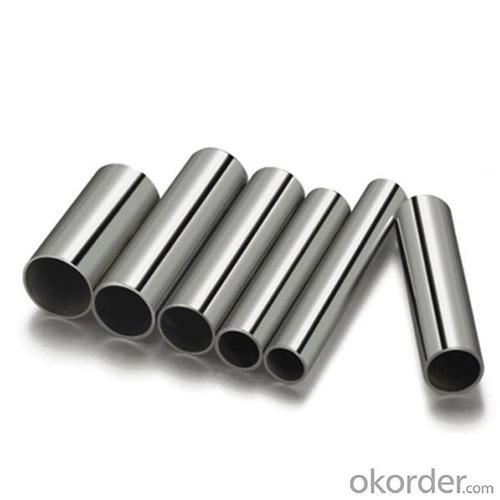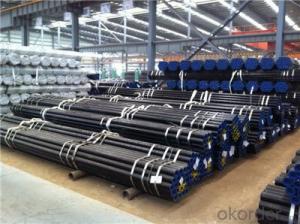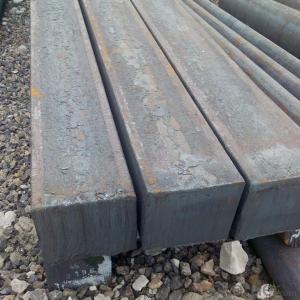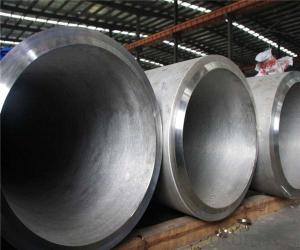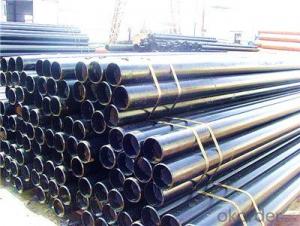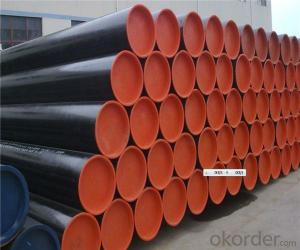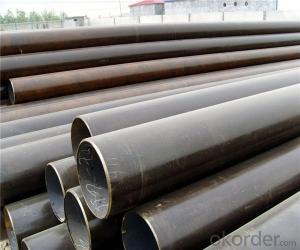Steel pipe from a good Chinese company CNBM
- Loading Port:
- Tianjin
- Payment Terms:
- TT OR LC
- Min Order Qty:
- 10 m²
- Supply Capability:
- 100 m²/month
OKorder Service Pledge
OKorder Financial Service
You Might Also Like
Specification
1.Structure of Seamless Pipe ASTM A106/53:
Seamless pipe is formed by drawing a solid billet over a piercing rod to create the hollow shell. As the manufacturing process does not include any welding, seamless pipes are perceived to be stronger and more reliable. Historically seamless pipe was regarded as withstanding pressure better than other types, and was often more easily available than welded pipe.
2.Main Features of the Seamless Pipe ASTM A106/53:
• High manufacturing accuracy
• High strength
• Small inertia resistance
• Good visual effect
• Reasonable price
| Tensile Strength (MPa) | ≥1080(110) | ||
| Yield strength(MPa) | ≥930(95) | ||
| Elongation(%) | ≥12 | ||
| Reduction of area(%) | ≥45 | ||
| Akv (J) | ≥63 | ||
| Impact roughness(J/cm2) | ≥78(8) | ||
| Hardness | ≤217HB | ||
| Specimen size | 25mm |
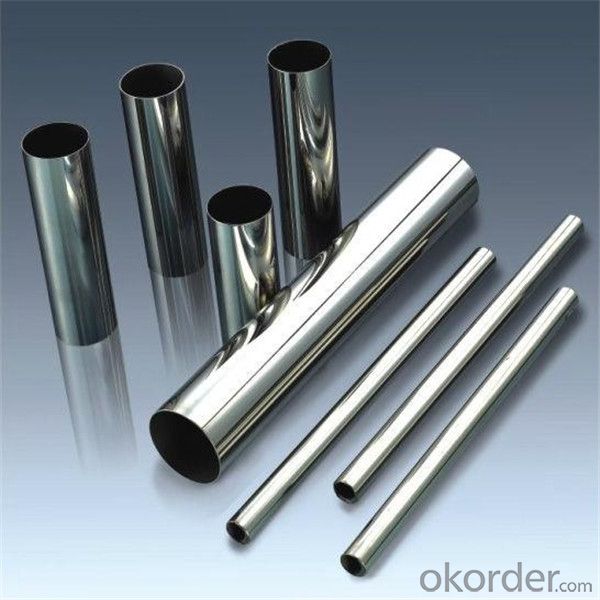
6.FAQ of Seamless Pipe ASTM A106/53:
A. How is the quality of your products?
Our products are manufactured strictly according to national and internaional standard, and we take a test on every pipe before delivered out. If you want see our quality certifications and all kinds of testing report, please just ask us for it.
Guaranteed: If products’ quality don’t accord to discription as we give or the promise before you place order, we promise 100% refund.
B.How about price?
Yes, we are factory and be able to give you lowest price below market one, and we have a policy that “ for saving time and absolutely honest business attitude, we quote as lowest as possible for any customer, and discount can be given according to quantity”,if you like you think, just don’t waste your time.Please trust the quotation we would give you, it is professional one.
C.Why should you chose us?
Chose happens because of quality, then price, We can give you both.Additionally, we can also offer professional products inquiry, products knowledge train(for agents), smooth goods delivery, exellent customer solution proposals.
Any question, pls feel free to contact us !
- Q: What is the role of steel pipes in the construction of stadiums?
- Steel pipes play a crucial role in the construction of stadiums as they are used for various purposes including structural support, drainage systems, and the installation of utilities such as water, gas, and electrical lines. These pipes provide the necessary strength and durability to support the weight of the stadium's roof, seating areas, and other infrastructure. Additionally, steel pipes enable efficient transportation of liquids and gases, ensuring proper functioning of the stadium's facilities.
- Q: How are steel pipes used in tunnel construction?
- Steel pipes are used in tunnel construction as structural elements to provide support and stability to the tunnels. They are commonly used in tunnel lining systems to create a strong and durable structure that can withstand the pressure and weight of the surrounding soil or rock. Steel pipes are also used for ventilation systems, drainage systems, and for carrying utilities such as water, gas, or electricity through the tunnel.
- Q: What are the different testing methods for steel pipes?
- Some of the different testing methods for steel pipes include visual inspection, ultrasonic testing, magnetic particle testing, radiographic testing, and hydrostatic testing.
- Q: How are steel pipes classified according to their wall thickness?
- Steel pipes are classified according to their wall thickness into three categories: schedule, standard, and extra strong.
- Q: How are steel pipes used in hydroelectric power plants?
- Steel pipes are used in hydroelectric power plants to transport water from the reservoir to the turbines. These pipes are designed to withstand high pressure and are often used for penstocks, which are large vertical pipes that deliver water to the turbines at a controlled rate. The durability and strength of steel pipes make them ideal for withstanding the force of the flowing water and ensuring a reliable water supply for power generation.
- Q: How are steel pipes used in the construction of nuclear power plants?
- Steel pipes are widely used in the construction of nuclear power plants for various critical applications. They are employed in the primary coolant system, where they carry and circulate the pressurized water or liquid metal coolant that transfers heat from the reactor core to the steam generator. Steel pipes are also utilized in the secondary coolant system, which transports the generated steam to drive the turbine for electricity production. Additionally, steel pipes are used for the construction of various auxiliary systems, such as the emergency cooling system or the ventilation system, ensuring the safe and efficient operation of nuclear power plants.
- Q: Which is cheaper, angle iron or steel pipe?
- Steel tube (Steel pipe) production technology development began in the bicycle manufacturing industry, the rise of the early nineteenth Century during the oil development, the two world war ships, boilers, aircraft manufacturing, manufacturing of power boiler after the Second World War, the development of chemical industry of petroleum and natural gas drilling and transportation, will effectively promote the the yield and quality of varieties, the development of steel tube industry.Steel pipe is not only used to transport fluid and powder solid, exchange heat energy, and manufacture mechanical parts and containers, but also is an economic steel. It can reduce weight and save 20 to 40% of metal by using steel pipe to make building structure, network frame, prop and mechanical support. Moreover, it can realize factory mechanization construction. Using steel pipe to manufacture road bridge can not only save steel, simplify construction, but also greatly reduce the area of coating protective layer, save investment and maintenance cost.
- Q: Can steel pipes be used for conveying abrasive slurries?
- Yes, steel pipes can be used for conveying abrasive slurries. Steel pipes are known for their durability and strength, making them suitable for handling abrasive materials such as slurries. However, to ensure longevity and prevent excessive wear, it is important to select the appropriate grade of steel and consider factors such as pipe thickness, lining options, and flow velocity. Additionally, implementing proper maintenance and inspection procedures can help to detect and address any wear or corrosion that may occur over time.
- Q: How are steel pipes cleaned and flushed?
- Steel pipes are cleaned and flushed using a variety of methods. One common method is high-pressure water jetting, where water is forcefully sprayed through the pipes to remove debris and sediments. Chemical cleaning agents are also used to dissolve any stubborn deposits. Additionally, mechanical methods such as using wire brushes or pigs (devices inserted into the pipes to scrape the interior) can be employed to remove any remaining buildup. Regular maintenance and inspection are crucial to ensure the cleanliness and efficiency of steel pipes.
- Q: What are the applications of steel pipes?
- Steel pipes are widely used in various industries and applications due to their exceptional strength, durability, and versatility. Some common applications of steel pipes include transportation of fluids and gases in oil and gas industry, water supply and drainage systems, structural support in construction projects, plumbing and heating systems, manufacturing of automobiles and machinery, and in the agricultural sector for irrigation and irrigation systems. Additionally, steel pipes are also used in the energy and power generation sector, chemical processing plants, and for underground and underwater installations.
Send your message to us
Steel pipe from a good Chinese company CNBM
- Loading Port:
- Tianjin
- Payment Terms:
- TT OR LC
- Min Order Qty:
- 10 m²
- Supply Capability:
- 100 m²/month
OKorder Service Pledge
OKorder Financial Service
Similar products
Hot products
Hot Searches
Related keywords
